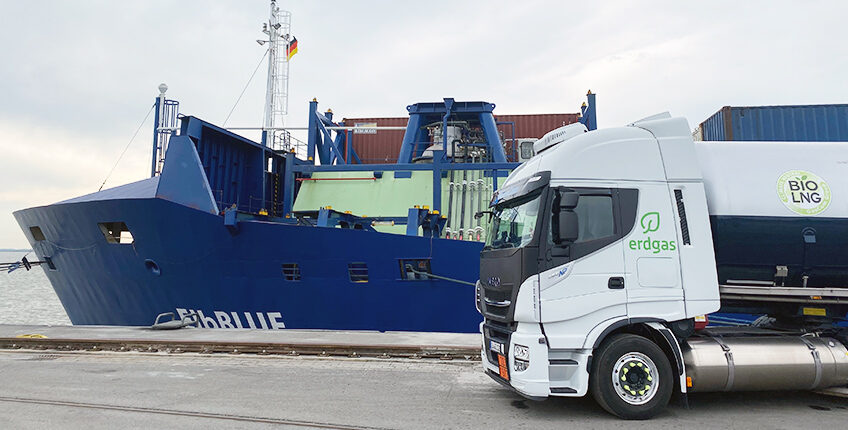The technical (exploitable) potential of renewable methane to replace fossil natural gas as a fuel for heavy-duty vehicles and ships is vast. This is the conclusion of a recent study by NOW GmbH and the Institute for Environmental Technology and Energy Economics (IUE) at the Hamburg University of Technology (TUHH), of which the final report was published today.
Researchers from the IUE at the TUHH were commissioned by NOW GmbH to prepare a study into the potential for renewable methane to be used as a fuel for ships and heavy commercial vehicles in Germany. Based on scenarios for the development of CNG/LNG demand in shipping and heavy goods transport, as well as for the sustainable production of renewable methane in Germany, the study investigated the substitution potential and the resulting greenhouse gas reduction potential of renewable methane as a truck and maritime fuel up to the year 2030.
Through the use of renewable instead of fossil CNG (Compressed Natural Gas) or LNG (Liquefied Natural Gas), greenhouse gas emissions in road freight transport could be reduced well-to-wheel by approximately 50 to 80%. In shipping, greenhouse gas emissions well-to-wake could be reduced by 35 to 80% by using sustainably produced renewable methane, especially depending on the methane slip of the engines used. For a greenhouse gas reduction of more than 80%, upstream emissions would also have to be reduced even further in the future, according to the report.
Moreover, the report highlights that the majority of the exploitable potential has not been harnessed to date. Due to their age structure, biogas plants in Germany would increasingly not be eligible for compensation under the Renewable Energy Sources Act (EEG – Erneuerbare-Energien-Gesetz) and would therefore potentially be able to make biogas available for the transport sector. Furthermore, reference is made to enormous untapped potentials of advanced biomethane in the order of 118–240 PJ/a, which can be produced from residual materials such as straw or liquid manure. In addition, there is also an as yet largely unutilised potential for electricity-based methane. Overall, the scientists conclude that the exploitable potential of renewable methane produced in Germany alone by 2030 would significantly exceed the demand for natural gas in the fuel segments analysed.
The identified potentials would indicate that the use of significantly larger quantities of renewable methane in the transport sector can already be expected in the short to medium term. Biomethane is not only the cheapest advanced biofuel, but also the only currently available type on the market in the required quantities as demanded by the minimum quota for advanced biofuels in the Federal Emission Protection Act (BImSchG – Bundesemissionsschutzgesetz). On this basis, the researchers assume that fossil CNG/LNG could be largely substituted by biomethane in road freight transport as early as 2025. This is expected to lead to an annual greenhouse gas reduction of 1.6 to 1.9 million tonnes of CO2 equivalent in road freight transport.
The report also points out, however, that renewable methane is generally more expensive than fossil natural gas, so that substitution will not occur on a purely cost-driven basis and without a regulatory framework. Due to the lack of regulatory requirements and incentives for use in shipping, the researchers do not assume that fossil LNG will be replaced by renewable methane in large quantities in the foreseeable future. However, the EU Commission’s “Fit for 55” package of measures published in 2021 and the draft FuelEU Maritime Regulation contained therein propose targets and initial measures to encourage the use of low greenhouse gas fuels in shipping. Nevertheless, the impact on fuel use is only to be expected in the medium term.


